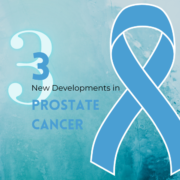Metastatic Prostate Cancer Treatment Sequencing: Emerging Research
Metastatic Prostate Cancer Treatment Sequencing: Emerging Research from Patient Empowerment Network on Vimeo.
What do metastatic prostate cancer patients need to know about developing treatment sequencing research? Dr. David Wise shares research updates about combination treatments and timing of treatments that have shown encouraging results.
Dr. David Wise is Director of Genitourinary Medical Oncology at the Laura and Isaac Perlmutter Cancer Center at NYU Langone Health. Learn more about Dr. Wise.
See More From INSIST! Prostate Cancer
Related Resources

|

Expert Perspective on the Future of Prostate Cancer Treatment and Research |

Why Prostate Cancer Patients Should Consider Participating in a Clinical Trial |
Transcript:
Katherine:
Dr. Wise, is there developing research or treatment news that prostate cancer patients should know about?
Dr. David Wise:
Yeah. I think in terms of other research, I think where we’re seeing a lot of excitement is in boosting the treatment at the time of initial diagnosis for men with metastatic prostate cancer, right?
So, what we’ve found is that for prostate cancer – and this has been true for some other cancers, but not all – it seem that when we use our best treatments early, we get a greater and greater return. We get a greater and greater durability of our effect and a more prolonged benefit of treatment effectiveness, of quality-of-life preservation, and a life span. That has really been, I would say, one of the key take-home points from the last five years.
And so, what’s exciting in the field is that we’re continuing to go in that direction. So, for example, there are clinical trials now testing some of the new CDK4/6 inhibitors like abemaciclib or Verzenio, which is a clinical trial that we have here for men who are initially diagnosed.
There are clinical trials testing lutetium PSMA 617 at the time of the initial diagnosis rather than waiting until treatment resistance develops. I think it’s a principle that’s emerged. I don’t know that I would call it a law. If it were, we wouldn’t have to do clinical trials, and that’s because with more exposure to these treatments, there is potential for more cumulative side effects with more combinations of treatments. There’s more potential for additive side effects that can occur from that combination.
So, we need to see and really prove to ourselves that treating earlier is better than treating in a one-treatment-at-a-time sequential approach. But I think that the lesson from many other cancers has really been that combination treatments have been the most effective treatments. And I think that now that we have additional effective treatments that have been approved as a standalone strategy.
What’s exciting now is that we’re now seeing the combination of these strategies into one, two, three, four drug regimens. And can we cure? And that’s, of course, what we’re really hoping for. That’s what we’re all striving for in oncology. So, that’s, I think, were a lot of the excitement is in oncology right now.










